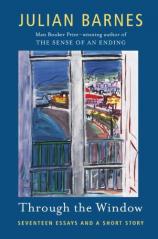Through the Window: Seventeen Essays and a Short Story
Review
Through the Window: Seventeen Essays and a Short Story
The comment I heard most often when Julian Barnes won the Man Booker Prize last year for THE SENSE OF AN ENDING was, “I thought he had won before.” One can debate the merits of literary awards, but if these tournaments of literary prowess have to exist, and their purpose is in part to draw attention (and sales) to the world’s best authors, then Barnes’s absence from the roster of Booker winners was a wrong that last year’s bestowal redressed. Barnes is one of our finest writers, and THE SENSE OF AN ENDING is one of his best performances.
His follow-up book, THROUGH THE WINDOW, is a collection of 17 essays, most of them previously published in the Guardian, the London Review of Books, and the New York Review of Books, plus a short story, “Homage to Hemingway,” which first appeared in the New Yorker. All 18 pieces are works of literary criticism and meditations on the art of writing. Barnes focuses on French, British and American authors, the writers who, judging from his work over the past 30 years, have had the greatest influence on him. That Barnes has such passionate opinions on books is expected from a man who grew up a son of schoolteachers. “We didn’t go to church,” Barnes writes in the book’s preface, “but we did go to the library.”
"Thanks to the personal details Barnes includes, THROUGH THE WINDOW is as much a work of autobiography as his magnificent NOTHING TO BE FRIGHTENED OF from 2008.... THROUGH THE WINDOW is one of the better collections of literary criticism you are likely to find."
Barnes became an avid reader at a young age, although not always for the most literary of reasons. His interest in the family’s bookshelves began when he first became aware of sex. His brother owned a copy of Petronius’s SATYRICON, “the hottest book by far on the home shelves.” The young Barnes looked through this book so often that the pages began to fall from the spine, and he was disappointed when he discovered that the other volumes in the family library didn’t provide the same erotic delights.
Eventually, his interest in subjects broadened so much that he became, in his words, a book-fetishist. He bought everything he could find, from first editions of Tennyson and Browning to PIG-STICKING OR HOG HUNTING and TAP-DANCING MADE EASY. Thus began the love of books that is so evident in his novels and in this group of essays.
Thanks to the personal details Barnes includes, THROUGH THE WINDOW is as much a work of autobiography as his magnificent NOTHING TO BE FRIGHTENED OF from 2008. In his appreciation of Penelope Fitzgerald, Barnes recalls the time he suggested that they share a taxi from King’s Cross. The elderly Fitzgerald declined, preferring instead to take the Underground because she could use the free pass issued to all pensioners. This anecdote sets up his analysis of the “benign wrong-footedness” of her writing --- the sentences that seem straightforward but that are denser and more devilishly clever than they at first appear.
Later, in his review of Joyce Carol Oates’s A WIDOW’S YEAR, her memoir of her first year after the death of her husband, Ontario Review editor Raymond Smith, Barnes writes with arresting warmth on the difficulty of dealing with the death of a spouse. “[W]e know that we shall never see the lost loved one again on terrestrial terms,” he writes, “never see, never talk and listen to, never touch, never hold.” He doesn’t say so, but two years before Barnes wrote this essay, his wife and agent, Pat Kavanagh, died of a brain tumor. That knowledge turns this powerful if critical review into a work of heartbreaking beauty.
Every page of THROUGH THE WINDOW shows Barnes’s masterful writing. In an essay on Ford Madox Ford’s THE GOOD SOLDIER, Barnes writes that a misleading verb on the first page “gives a creak under the foot as we put our weight on it.” He refers to Félix Fénéon’s NOUVELLES EN TROIS LIGNES, three-line news summaries written for Le Matin, as “the literary equivalent of the cocktail olive,” for which Fénéon “devised a piquant new stuffing.” He criticizes the assertion by Lydia Davis, one of many MADAME BOVARY translators, that faithful translations “may be kind of clunky” with the retort, “Davis’s division of previous translators into flair-bringers and clunkheads doesn’t really hold.”
Occasionally, Barnes is guilty of ignoring obvious flaws in the work of writers he admires. His pieces on John Updike, for example, border on hagiography and say nothing of Updike’s huge misogynistic streak. But despite its occasional lapses, THROUGH THE WINDOW is one of the better collections of literary criticism you are likely to find.
Reviewed by Michael Magras on November 30, 2012
Through the Window: Seventeen Essays and a Short Story
- Publication Date: November 20, 2012
- Genres: Essays, Nonfiction
- Paperback: 272 pages
- Publisher: Vintage
- ISBN-10: 034580550X
- ISBN-13: 9780345805508




